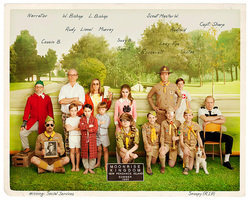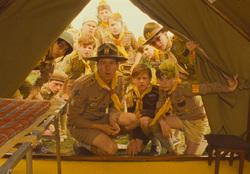
Director: Wes Anderson
Starring: Jared Gilman, Kara Hayward, Edward Norton, Bruce Willis, Bill Murray, Frances McDormand, Tilda Swinton and Jason Schwartzman
Moonrise Kingdom is a story of young love, attempting to break free from old hate. Sam (Jared Gilman) and Suzy (Kara Hayward) decide to run away from their town and venture off into the woods, escaping the troubles of themselves and their families. However this love induced act of rebellion garners the attention of not just Suzy’s lawyer parents (Played by Bill Murray and Frances McDormand) but also Sam’s former scout master, Scout Master Ward (Played by Edward Norton) and the local policeman, Captain Sharp (Played by Bruce Willis) who all rush to find the children before Sam falls into the clutches of Social Services (Played by Tilda Swinton)
I really liked Moonrise Kingdom. Despite being aware that Anderson had a very distinct visual style, until viewing Moonrise Kingdom in a cinema (I had viewed his previous work on TV screens) I had always associated Anderson more with the written word than flourishing frames. However from the very opening scene of Moonrise Kingdom, I was aware of Wes Anderson, the director. Moonrise Kingdom is a beautiful film to look at, whether it is the delicately assembled sets and costumes, which would make somebody with OCD satisfied, or Robert D. Yeoman’s incredible cinematography, which at times seems to bathe the screen in single colours, frequently of yellow and come its absurdist climax, blue.
You could simply take still shots of each frame from Moonrise Kingdom, assemble them, play Alexandre Desplat’s score or the soundtrack that Wes Anderson has gathered and have an incredibly satisfying experience. However that insinuates that this film, like Anderson’s previous have been according to my own recollections and the critical opinions of others, is style over substance. However the reason Moonrise Kingdom worked, was not because it was immaculately designed, beautifully shot or superbly scored, but because for the first time viewing a Wes Anderson film, the characters and the story shone through the artsy exterior.
Come this film’s conclusion I was left charmed, satisfied and willing to spend more time with these characters, whereas with The Royal Tennenbaums I was so desperate to escape those characters I did not even reach the film’s conclusion. As many have rightly noted, the heart and soul of this film rests in Sam and Suzy, and the brilliant performances of Jared Gilman and Kara Hayward. Having a decent portion of your film rest solely on child actors is a big risk for any director to take. Child actors can have the tendency to, out of understandable nervousness, overact and over compensate for their lack of dramatic experience. However Jared and Kara give such subtle, understated, real performances despite the fantasy of the world they inhabit and the dialogue they are sharing.
Wes Anderson films have a tendency to feel more alien than science-fiction films, with his style coming at the expense of any emotional reality. However in Moonrise Kingdom some truth and genuine emotion leaks through the film’s oh so cool exterior. A scene where Sam and Suzy start dancing and eventually kissing is one that straddles the line between hilarity, sweetness and awkwardness all at once. You feel awkward watching it, yet at the same time laughing at them, while being charmed with them. It is one of the rare moments in the film and I am hypothesizing his body of work, where Wes Anderson keeps the camera still, has no set yet the gifts of nature and is simply letting his screenplay and actors do the talking. If Anderson had decided to go a bit more visually inventive or wacky with that scene, the genuine emotion displayed by his young actors and felt by the audience would be lost. Now given my lack of knowledge regarding Anderson’s previous work this may be a false statement however, at times in Moonrise Kingdom there is a level of restraint that I have personally found missing from my previous encounters with him.
However Anderson’s wacky style and humour that I previously found grating, worked for me in this film. All the scenes involving the Khaki Boy Scouts are dry, subtle, yet at the same time incredibly over the top, comedic genius. The moment I knew this film had started to win me over came with the tracking shot of Edward Norton’s scoutmaster getting out of his tent, picking up his ironed bandana and walking through the camp, giving bizarre orders, responding to bizarre inquiries, chastising the world’s tallest tree house and sitting down for breakfast with his troupe. Edward Norton is one of my favourite actors and he gives a hilarious performance as the incompetent, earnest Scout Master. He also has the pleasure of being involved in a wonderful visual nod to one of my favourite films of all time, The Shawshank Redemption.
In terms of the other supporting performances, Bruce Willis shows a nice vulnerability and sweetness to him, a dimension I suppose will be missing from The Expendables 2 and the now delayed Gi-Joe 2. The scene he shares with Sam is another moment of the film’s emotional truth coming to the fore and I really liked where they took the character of Captain Sharp, even if I wish they had developed him a little bit more. This problem of depth amongst the supporting players surfaces most in regards to Murray and McDormand. While I loved the little stylistic tick of how they always spoke like lawyers, I wish their marital problems that are hinted to have such an effect on their daughter, were developed a little bit more. While Anderson does demonstrate restraint and a desire to delve deeper into some of his characters than before, he doesn’t seem willing to take the full plunge with this film.
One of the best supporting presences however comes with Tilda Swinton. Arguably one of the film’s funniest flourishes is the fact that her character is just called, Social Services. Whether you find the thought of somebody just being called Social Services in every context funny (Sitting in a plane during a storm, “Hold on Social Services”) will determine whether you will find this film funny. The way she is presented as the pantomime villain, speaking of electro-shock therapy, is an example of the wacky, inventive, crazy yet subtle side of Wes Anderson’s work, and an example I can appreciate.
As the storm started to gather force and the characters be brought together, I found myself feeling genuine excitement and tension as Wes Anderson built up his crazy climax, with moments of knowing absurdity, which will, either leave you laughing with the film, ignorantly laughing at it, or simply deriding it. Moonrise Kingdom’s stylish nuances did not all win me over however and there is a red-coated narrator character, which doesn’t quite work. There are ideas (The relationship between the Willis and McDormand characters) and simple objects (Such as a kitten) which are brought up and never fully developed or seen again, with the annoying Anderson appearing every so often, with one piece of quirkiness too many. However on the whole, my flaws with Moonrise Kingdom as of now are minor ones. I do not think this a great film yet, however I feel this is one that could grow on me with repeat viewings and creep up my list for best of the year. The performances amused and charmed me, the direction and cinematography amazed me and the story left me satisfied and wanting more.
This is a film which will inspire me to revisit The Royal Tennenbaums and meet Wes Anderson’s previous films to discover whether Moonrise Kingdom is an anomaly, or a sign that I have been a Wes Anderson fan, all along.

Rating: 7+/10
By Movie Parliament Prime Minister,
Michael Dalton
Disagree with this review? Give us your thoughts in the comments below.
 RSS Feed
RSS Feed
